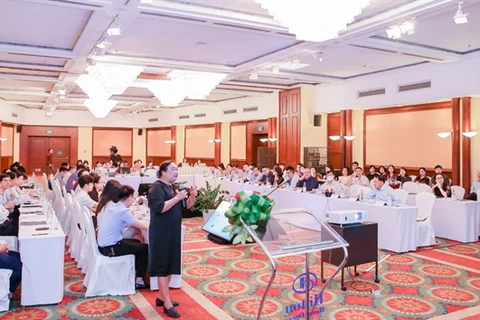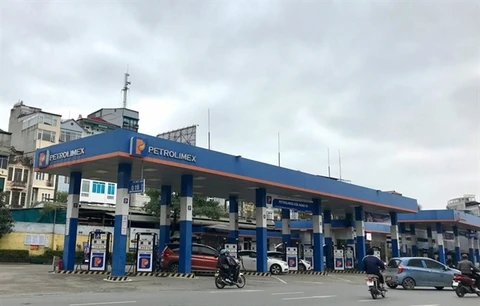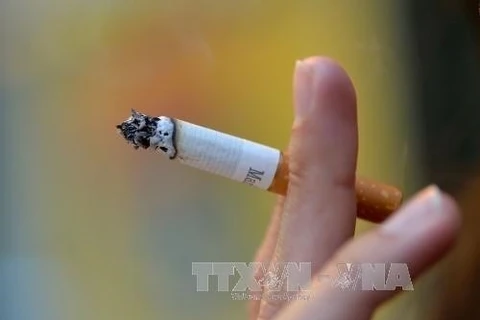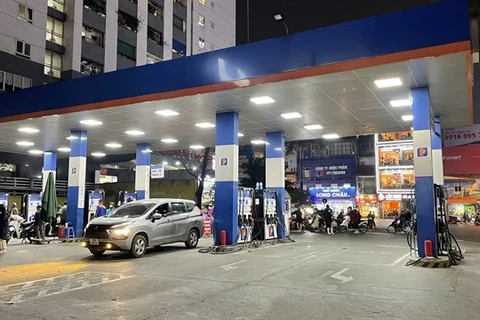
A man buys a sugary drink. A potential increase in taxes aimed at sugary beverages has aroused mixed responses. (Photo: vnbusiness.vn)
Dau Anh Tuan, Deputy General Secretary of the Vietnam Chamber of Commerce and Industry (VCCI)’s, said that the Ministry of Finance sent a report to the Government about the proposal of amending law on special consumption tax.
The highlight of the proposal was expanding the base for special consumption tax which aims to levy excise taxes on products and services including sugary soft drinks, barley beverages, non-alcoholic soft drinks, new tobacco products and online games. In addition, the increases in excise taxes on tobacco and alcohol would be put into consideration.
Tuan said that mixed opinions were arising around the proposals, especially the imposition on sugary beverages, which the Ministry of Finance said aimed to protect the health of the people and prevent obesity.
According to Nguyen Minh Thao, head of the Business Environment and Competitiveness Research Department under the Central Institute for Economic Management, it is necessary to study the impacts of the imposition of a special consumption tax on sugary beverages.
Thao questioned whether the targets of the policy, including public health and budget revenue, could be achieved, especially given businesses are in a lot of difficulty.
There were about 1,800 production establishments in the beverage industry which provide some 300,000 jobs.
Thao said that the imposition of a special consumption tax on the beverage industry could bring negative impacts, such as higher prices and lower consumer demand, which would result in a lower contribution to the budget.
She said that the imposition of a 10% special consumption tax rate on sugary drinks would cause drops in output, GDP, income of workers as well as budget. It was estimated that the 10% excise tax rate on sugary drinks would bring an additional revenue of nearly 2.28 trillion VND but cause a decrease of 3.16 trillion VND for the beverage and sugar industries, meaning a drop of 880.4 billion VND in total.
The impacts would also spread to thousands of workers in the value chains of the industry and around 9,000 small- and medium-sized enterprises and 1 million business households.
Nguyen Van Viet, Chairman of the Alcohol–Beer–Beverage Association (VBA), said that inappropriate tax reforms would significantly affect the recovery of enterprises and growth targets, especially in the context of economic difficulty.
Vu Tu Thanh, Deputy Director of the US–ASEAN Business Council, said that there were 45 countries around the world that levied special consumption tax on sugary drinks. However, experiences in some countries showed that the policies were not as effective as expected in preventing obesity.
For example, in Chile, the obesity rates in men and women were 19.2% and 30.7%, respectively, in the 2009-2010 period. After the imposition of a special consumption tax on soft drinks in 2014, the obesity rates increased to 30.3% and 38.4%, respectively in the 2016-2017 period.
According to Nguyen Thi Lam, former Deputy Director of the National Institute of Nutrition, there were a number of causes of obesity such as unhealthy nutrition and lack of exercise.
Soft drinks were not the only supply of calories in foods, she said, adding that the imposition of an excise tax on sugary drinks might not be able to solve the problem of weight gain and obesity.
She cited a study that sugary drinks only accounted for an average of 1.1% of the total calories from food and beverages.
The ASEAN Food Security and Nutrition report in 2021 found that sugary foods and sweets in general only provide about 3.6% of the total energy intake from food and beverages while the most energy sources were cereals (51.4%), meat (15.5%), other foods (11.5%), including vegetables and fruits (6.9%).
The levy of excise tax on sugary beverages would not be able to solve the problem of weight gain and obesity because many foods contain sugar and calories on the market, she said.
Tran Ngoc Trung, head of the legal department of the American Chamber of Commerce in Hanoi, said that sugar was a special commodity which enjoys protection policies such as quotas, anti-dumping and subsidy policies. Thus, the imposition of excise tax on sugary products would go against the policy of promoting the development of the sugar industry.
Besides, the target of budget revenue would hardly be achieved when the tax imposition would cause a decline in production.
Thai Quynh Mai Dung, a standing member of the National Assembly’s Committee for Foreign Affairs said it was necessary to amend the Law on Special Consumption Tax but when and how to amend it must be put into careful consideration, in which the opinions of enterprises are important.
Game makers want fairness
Domestic game companies said that the imposition of special consumption tax would have negative impacts on this promising digital industry, especially given they claim to be facing with unfair competition in the market.
Nguyen Trong Nghia, a representative of the Vietnam Game Developers and Publishers Alliance, said that with an average growth rate of 9% per year, higher than the regional average, Vietnam was a very lucrative market in the eyes of foreign enterprises.
This is cited as the reason domestic game developers are faced with harsh competition from foreign firms. Statistics of Newzoo showed that the total revenue of domestic game companies accounted for just 22% of the total.
The imposition of a special consumption tax on the game industry would undermine the competitiveness of domestic game developers and make it impossible for them to compete with foreign rivals who were not subjected to the tax in the Vietnamese market, Tran Phuong Huy, Director of VTC Intecom, said.
The targets of the policy – adjusting behaviours of gamers and increasing budget revenue – wouldn't be likely to be achieved, he said.
La Xuan Thang from VNGGames said that the special consumption tax would kill domestic developers and the market shares would fall into smuggled products which would make it more difficult to manage.
Thang said that the gaming industry wants to be treated as fairly as the rest of the entertainment industry.
Experts also said that it was necessary to have an appropriate roadmap for adjusting the tax rates on tobacco./.
VNA























